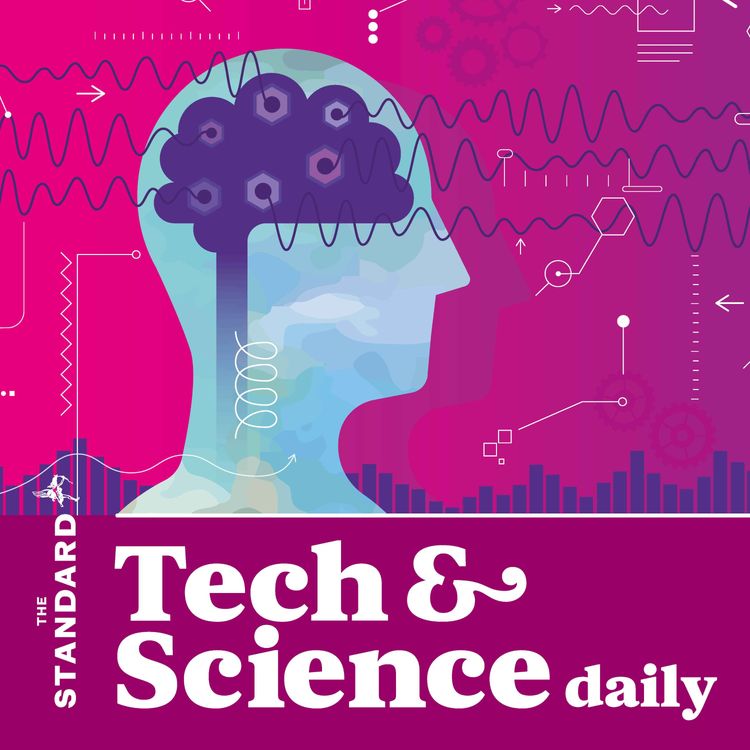Share

Tech and Science Daily | The Standard
Why Mount Everest is growing taller...
Season 1
•
The world’s tallest mountain is growing taller, and scientists think they know why. We speak to Adam Smith, co-author of the study from University College London. The UK’s last remaining coal-fired power station has closed, with Simon Lewis, professor of global change science at UCL.
Plus, why has musician Aurora performed a gig in the Arctic?
Also in this episode:
- Storm Helene: Electric vehicle saltwater fire risk
- Pine martens return to the South West of England for the first time in more than a century
- Daniel Kaluuya to be recognised with statue in London's Leicester Square
Check out this week's episode of Sustainable Travel: why nature tourism can be such a life-enhancing experience.
More episodes
View all episodes

Gaming & Gadgets Round-Up 2025: Switch 2, GTA VI Delays, Steam Deck Shifts and Samsung’s Tri-Fold Flex
05:35||Season 1Alan Leer rounds up 2025’s biggest gaming and gadget moments — Switch 2’s launch, the year’s top awards winner, GTA VI’s delay, Steam Deck pricing shifts, and foldables going full tri-fold.
Science Round-Up 2025: NHS Gene Editing, UK Heat Records, and a Nobel-Winning Quantum Moment
05:42||Season 1Alan Leer runs through the biggest science threads of 2025 — from world-first gene editing on the NHS and UK temperature records to Nobel-level physics and a rare interstellar visitorFor the latest news, visit Standard.co.uk
Tech 2025 Round-Up: AI Agents, Online Safety Rules, Digital ID — and London’s Data-Centre Power Crunch
07:32||Season 1In this Tech 2025 round-up, Alan Leer breaks down the year’s biggest tech themes: AI shifting from chatbots to agentic tools, the UK’s Online Safety Act enforcement, new digital ID plans, tougher competition rules for Big Tech, the privacy and ad-tracking shake-up, and why London’s data-centre boom is colliding with electricity grid limits.
Christmas Eve Tech & Science Daily: Whitechapel fatberg, Crystal Palace Dinosaurs glow-up, Fortnite Winterfest, GTA festive gifts, and a hopeful Parkinson’s science update
06:46||Season 1On this Christmas Eve edition of Tech and Science Daily from The Standard, we’re keeping it festive but still very London: Thames Water tackles a fresh Whitechapel fatberg blockage, while Crystal Palace Park’s iconic Victorian dinosaur sculptures get a long-overdue restoration glow-up. After the break, we dip into seasonal gaming with Fortnite Winterfest and GTA festive gifts, plus a quick consumer tech check-in for last-minute kit. And in science, we’ve got a hopeful update on new research reshaping how we think about dopamine and movement in Parkinson’s. Head to Standard.co.uk for all the latest
London robotaxis set for 2026 trials, the UK’s “year of the octopus”, and how AI digital twins could reshape future cities
09:46||Season 1On today’s Tech and Science Daily from The Standard, we look at plans for robotaxi trials in London in 2026, plus the surprising UK science story being dubbed the “year of the octopus” after a boom in sightings and catches off England’s south coast. Then Alan Leer drops into an interview with Johannes Maunz, Senior Vice President of AI at Hexagon, on AI-enhanced digital twin mapping — and how virtual city models could help London plan everything from driverless transport to climate-resilient infrastructure and pedestrian-first streets. For more updates, visit standard.co.uk
Vodafone franchisee legal battle: 62 ex-partners sue, MPs step in — plus Starlink “super Wi-Fi” on Waterloo trains
11:32||Season 1On Tech and Science Daily from The Standard, we lead with an extended interview package on claims from former Vodafone franchisees — with 62 ex-partners taking legal action and Vodafone denying wrongdoing. Plus, a London commute upgrade: South Western Railway trials Starlink-powered “super Wi-Fi” on routes in and out of London Waterloo, and we wrap with a quick contactless payments rule change and a free S.T.A.L.K.E.R. 2 content update. For more, visit standard.co.uk.
Professor Tim Spector and Dr Federica Amati on Brave New World (Preview)
15:15||Season 1On our sister podcast Brave New World, Host Evgeny Lebedev is joined by Professor Tim Spector and Dr Federica Amati — two of the leading scientific voices behind personalised nutrition company ZOE — to rethink everything we’ve been told about food. From the myths around “good” and “bad” fats to calorie-counting obsessions, they explain why so much nutritional advice is outdated, oversimplified, and in some cases actively harmful. They also explore the impact of ultra-processed foods on gut health, question whether breakfast really is the most important meal of the day, and unpack how time-restricted eating could help optimise daily health.Here’s your special preview. To hear the full episode, just search Brave New World Evening Standard on your podcast app.
Steam Winter Sale starts, UK planning shake-up for broadband, Ofcom hands out an Online Safety Act fine — plus a wholesome “robot double” school story
07:48||Season 1The Government opens a call for evidence on reforming planning rules to speed up digital infrastructure rollouts in England, Ofcom issues a £20,000 fine under the Online Safety Act for failing to respond to information requests, and the Steam Winter Sale kicks off for the annual backlog-pile-on. We also finish on a genuinely wholesome tech-for-good story from SpecialEffect, where a small telepresence “robot double” helps a child stay connected to school during leukaemia treatment. For all the latest news head to Standard.co.uk
London councils cyber incident update, London quantum cluster, UKRI boosts games and AI, plus Revolut Mobile and Alexa+ on the web
05:30||Season 1Today on Tech and Science Daily from The Standard: the latest on the Westminster and Kensington & Chelsea cyber incident, a quantum year-end update from Imperial and the London Quantum Cluster, and UKRI’s shift toward growth funding — including video games. Plus, Revolut’s new UK mobile service, Alexa+ arriving on the web, and a couple of practical gaming and headset updates